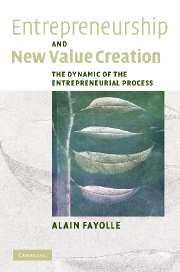Book contents
- Frontmatter
- Contents
- List of figures
- List of tables
- Foreword
- Acknowledgements
- Introduction
- Part I Perceptions of entrepreneurship
- Part II Entrepreneurship and the entrepreneurial system
- Part III Entrepreneurship and entrepreneurial processes
- Part IV Entrepreneurial process dynamics
- Conclusion
- References
- Index
Part IV - Entrepreneurial process dynamics
Published online by Cambridge University Press: 22 September 2009
- Frontmatter
- Contents
- List of figures
- List of tables
- Foreword
- Acknowledgements
- Introduction
- Part I Perceptions of entrepreneurship
- Part II Entrepreneurship and the entrepreneurial system
- Part III Entrepreneurship and entrepreneurial processes
- Part IV Entrepreneurial process dynamics
- Conclusion
- References
- Index
Summary
In the third part of this book, I defined and discussed the notion of entrepreneurial process and proposed a generic model in line with conceptual and epistemological choices. The foundations of the theoretical approach are based on the assumption that entrepreneurship is a subject/object dialogic, and my work revolves around the interacting individual/new value creation system.
‘The process is a sequence of concomitant and/or successive configurations and interactions under the impact of compensating and amplifying regulations specific to the system concerned’ (Jacquet-Lagreze et al. 1978). The process is a dynamic and evolving system in which time plays an essential role. The main engine of the process is teleological, which means that change is the consequence of the assignation of goals and the expression of a vision aspiring to a desired end state.
I proposed three distinct stages to describe the evolution of the system: the process trigger, the commitment to the process, and the process survival/development phase. The final three chapters of this book are devoted to developing these three phases. For each phase, I will propose and explore theoretical corpuses in order better to understand its dynamics. These theories should help us answer the following research questions: how can we better understand and model, in our chosen perspective, the trigger of the process, commitment to the process, and the survival/development of the project and the newly formed company.
- Type
- Chapter
- Information
- Entrepreneurship and New Value CreationThe Dynamic of the Entrepreneurial Process, pp. 161 - 163Publisher: Cambridge University PressPrint publication year: 2007
- 2
- Cited by



